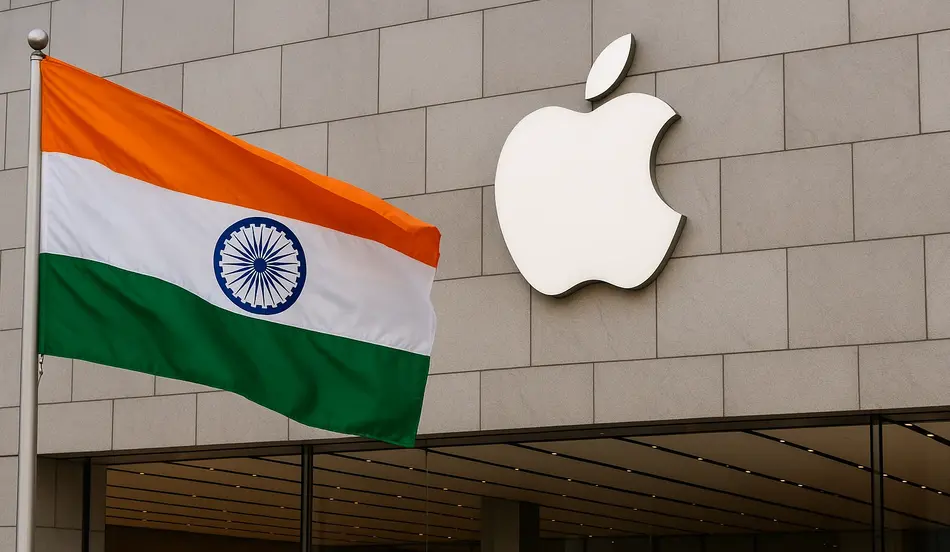India, long seen as one of America’s closest partners in Asia and a counterweight to China, is signaling a sharp shift in foreign and economic policy. New Delhi is reportedly considering freezing major U.S. corporate projects—including Apple’s flagship production expansion—in retaliation for new tariffs imposed by President Donald Trump.
The development, first reported by The Economic Times of India and the Financial Times, has shocked analysts who only months ago considered India central to Washington’s Indo-Pacific strategy.
Apple in the Crosshairs
At the center of the dispute is Apple, the symbol of American tech dominance. Over the past decade, the company moved aggressively to diversify away from China, where rising nationalism, tighter regulations, and escalating trade tensions created mounting risks.
India, with its 1.4 billion people, generous investment incentives, and status as a U.S. ally, quickly became the prime alternative. Factories run by Foxconn, Pegatron, and Wistron in Tamil Nadu and Karnataka already assemble iPhone 12, 13, and 14 models. By 2027, analysts expected nearly one in four iPhones worldwide to be produced in India.
But Bloomberg sources say the Indian government is now weighing whether to block new Apple plants and halt production lines already under construction. Such a move would upend Apple’s supply chain strategy, shake investor confidence, and potentially ripple through U.S. markets.
“India is essentially threatening to cut off oxygen to one of the world’s most profitable corporations,” one analyst told Reuters. “And it’s doing so to send a political message directly to Washington.”
Tariffs Spark Retaliation
The trigger was President Trump’s decision to impose new tariffs on Indian exports, ranging from textiles to pharmaceuticals. The White House argued the tariffs were needed to protect American jobs.
In New Delhi, the move was perceived as a direct slight. The Hindustan Times reported: “Washington has underestimated how much India has changed. If before the country had no choice but to listen to the U.S., today it has its own levers of pressure.”
Those levers increasingly involve China. The South China Morning Post reported that Indian and Chinese delegations held quiet meetings in Dubai and Jakarta in recent months, discussing joint energy projects, currency trade settlements, and possible coordination at the upcoming BRICS summit.
For Washington, the prospect of India drifting toward Beijing represents a strategic nightmare. Trump had spent years portraying India as a partner to help counterbalance China’s rise. Now, his own policies risk driving New Delhi closer to its rival.
Washington Weighs Options
The White House is scrambling to respond. According to Reuters, officials are debating restrictions on Indian IT firms and potential changes to visa programs used heavily by Indian engineers.
But such steps risk backfiring. Indian professionals are deeply embedded in Silicon Valley, powering development at Google, Microsoft, and hundreds of startups. Limiting their access could weaken U.S. competitiveness in the very industries Trump has vowed to strengthen.
Meanwhile, Apple faces its own dilemma. India was supposed to secure its supply chain while opening a massive new consumer market. Any disruption could not only delay production but also erode Apple’s ability to compete with Chinese rivals in Asia.
A Strategic Earthquake
Observers say the tariff fight reflects a deeper geopolitical shift.
“India is no longer a junior partner,” wrote Foreign Affairs. “It is increasingly acting as an independent power center, willing to use its economic power as a tool of foreign policy.”
That shift may become official at the upcoming BRICS+ summit, which India is hosting. Sources say discussions could include new settlement mechanisms in rupees and yuan for energy trade, a move that would weaken the U.S. dollar’s global dominance.
If India aligns more openly with China, Washington’s Indo-Pacific strategy could unravel, leaving the U.S. reliant primarily on Japan and South Korea as regional allies.
In Times of Global Shifts, Talent Is Your Strongest Asset
Whether markets are steady or shaken by geopolitical change, the right people keep your business moving forward. Find them on WhatJobs today.
Post a Job Now →The Risk for Trump
For President Trump, the fallout could extend far beyond economics. Critics argue the dispute mirrors America’s earlier miscalculation with China, when policymakers assumed economic integration would ensure cooperation. Instead, Beijing became America’s fiercest competitor.
Now, India—once embraced as a strategic ally—may be charting its own path, even if it means working more closely with Beijing.
“If Trump loses India,” wrote The Guardian, “it could become the greatest foreign policy defeat of his presidency.”
What’s Next
The coming months will be decisive. If India follows through on freezing Apple’s projects, it could send shockwaves through global markets and directly challenge U.S. economic influence in Asia. If Washington retaliates against Indian IT or visa programs, it risks alienating one of the fastest-growing trade partners.
Either way, analysts warn, the episode highlights a new reality: India is no longer bound to Washington’s playbook. Rather, it is becoming a more autonomous power that is more prepared to reject the United States.
FAQs
1. Why is India threatening Apple projects?
As retaliation for new U.S. tariffs on Indian goods, New Delhi is signaling it may block Apple’s expansion to show Washington it has leverage.
2. How important is India to Apple’s supply chain?
Very. By 2027, nearly 25% of iPhones were projected to be made in India. The country is also a rapidly growing consumer market for Apple products.
3. Could the U.S. retaliate against India?
Yes. Options under discussion include limiting Indian IT companies’ access to the U.S. market and tightening visa programs for Indian engineers. But these moves could also hurt American firms.
4. What does this mean for U.S.–China relations?
If India moves closer to China, Washington loses its key counterweight in Asia, undermining decades of U.S. strategy in the region.




